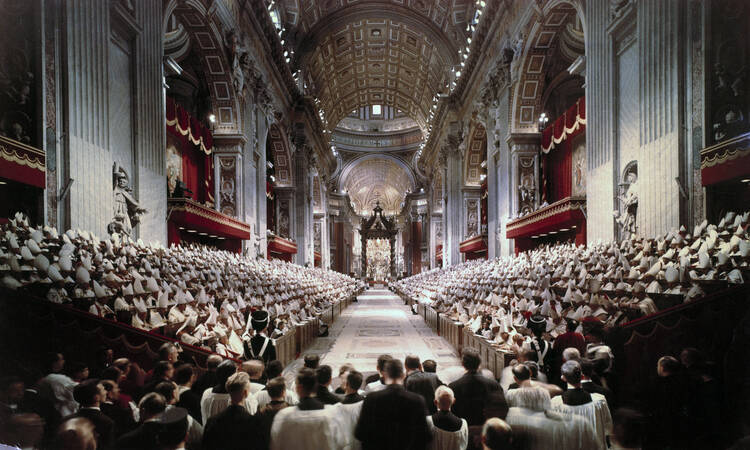The interest in Church affairs sparked by the Second Vatican Council has forced journalists, TV commentators, the man in the street, and even some professional theologians, to brush up on the latest in theological terminology. One term that keeps popping up with great frequency is "collegiality." It designates a development of profound importance for the future course of the Council, and thus of the Church.
Perhaps the commonest use of the term is to indicate that the bishops of the world, as a body, are heirs of the twelve Apostles. In a sense, as Fr. Gregory Baum, O. S. A., has remarked, its more basic meaning refers to the Church as a whole. "The Church being the mystery of charity in the world, incarnate in a community, embraces her members in such a way that in all significant actions all members are in some sense involved." The fact remains, however, that the concept of a body of bishops acting collegiately, as a college or conference, has rightly attracted the greatest attention and interest at the present moment.
Like so many developments in the Church, interest in this concept represents a return to, or renewal of interest in, a very ancient Catholic tradition. Indeed, some see in this renewed emphasis a much needed corrective to popular thinking. For some time, a common tendency has been to picture the Church in such a way as to leave the inadequate impression that all power and teaching authority is in the Pope. Actually, the bishops, in union with the Pope, their head, exercise their sacred ministry for the good of the universal Catholic community. Events in the first session of the Council served to demonstrate the high consciousness which the bishops of the whole world have of their corporate responsibility.
As a matter of fact, such a reorientation toward more autonomous corporate or collegiate exercise of their episcopal office by national or regional groups of bishops has long been under way. Here in the United States, the National Catholic Welfare Conference came into existence more than forty years ago. Today it ranks as the second oldest episcopal conference in the world. After World War II, increased realization of the complexity of problems in the modern world, and of the need for greater flexibility in dealing with local problems on the scene, gave a sharp impetus to the establishment of similar organizations in many places. In 1955, with the setting up of the Latin American Bishops' Council (CELAM), the first federation of hierarchies of different countries came into being. Most recently, the creation last October of a secretariat for all African bishops—designed primarily to co-ordinate their efforts at the Council—marked yet another significant advance in this same direction.
The present moment poses what may well be the most pressing demand on such bodies for the exercise of collegiate responsibility by the hierarchies of the world. Experience at the Council's first sessions revealed the necessity for joint preparatory labors and co-ordinated efforts if the Council is to accomplish its objectives and complete them in a reasonable time. To this end, German-speaking bishops from five European nations have already met in Munich, in February, in response to the Pope's urgent request for unremitting, co-operative work by all the bishops during this time of recess.
It is probable that similar meetings will take place in Europe and elsewhere before the regular sessions of the Council resume in September. Through this very process, one can also expect a further clarification of the concept of "collegiality" and its special relevance for the inner life of the Church in our times.








